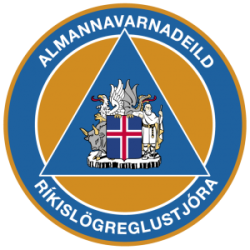Civil Protection
Citizens frequently need to deal with dangerous natural hazards and their severe consequences. The interaction of human and natural forces also causes disruption to community infrastructure.
Civil protection and civil protection committee
Civil protection is a co-ordinated response due to dangerous and emergency situations.
The state is responsible for civil protection on land, sea and air. The local authorities are responsible for civil protection in their municipality in co-operation with the state.
Civil protection emergency planning is done by the police, fire department, rescue teams, health department, coast guard, Red Cross and other non-profit organisations and employees of local authorities.
The national civil protection co-ordination/command centre of the National Commissioner of the Icelandic Police (NCIP) is at Skógarhlíð 14 in Reykjavik.
The civil protection department has overall supervision of assistance between districts and manages civil protection assistance from state agencies to districts.
Information on civil protection within districts can be found on the local authority websites.
The civil protection committee forms policy and organises the civil protection within their district. Including the preparation of risk assessments and action plans which aim to:
protect the well-being and safety of the public and prevent them from harm, and to protect property and the environment from disasters, caused by natural or manmade hazards, pandemics, military action or other reasons,
render relief and assistance for any losses that have occurred.
Emergency response plans are tested and risk assessments are reviewed regularly.
Trauma counselling
Trauma counselling is a health service which falls under the Directorate of Health. Trauma counselling in major accidents and emergencies fall under the jurisdiction of civil protection but the responsibility is with the Directorate of Welfare.
The effect of volcanic activity on animals and vegetation
Adverse effects of volcanic activity on animals in Iceland are primarily caused by toxic substances carried by volcanic ash, which falls to the ground on vegetation and drinking water.
Links of interest
Laws and regulations

Service provider
Department of Civil Protection and Emergency Management